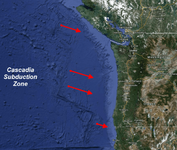- Messages
- 1,926
- Reactions
- 3,614
Ore. lawmakers hear chilling quake forecast - Koinlocal6.com
No need to prep. It'll never happen. Ya'all are paranoid. What good will a bunch of food, water and fuel do you?
No need to prep. It'll never happen. Ya'all are paranoid. What good will a bunch of food, water and fuel do you?












